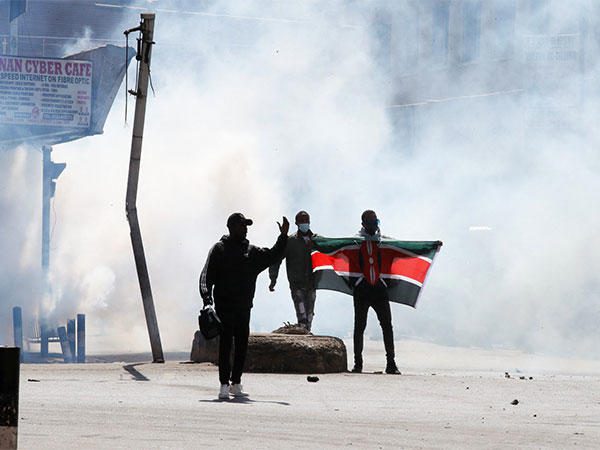Safaricom In Hot Seat As Top Telco Faces Accusations Amid Protests In Kenya

Following last week’s demonstrations, Kenya erupted in protest this week against a new finance bill seen as exacerbating economic hardship.
The demonstrations, which have registered at least 13 fatalities per Reuters as police opened fire on protestors on Tuesday, were accompanied by a nationwide internet disruption, and a human rights group documented alleged abductions of protestors.
Amid this turmoil, Kenya’s leading telecommunications giant Safaricom finds itself at the centre of a firestorm of accusations following service outages and disappearances.
Double Disruption: Protests and the Net
The internet disruptions significantly impacted Kenya, with neighbouring countries also experiencing disruptions. The Kenyan government denied any involvement, while NetBlocks, an internet rights watchdog, pointed to the timing of the outage – coinciding with the protests – and its impact being more severe than typical subsea cable cuts, raising the possibility of “unscheduled maintenance.”
“The outage occurred just around the moment protesters attempted to storm parliament,” said Isik Mater, Director of Research at NetBlocks, in a statement to TechCrunch.
Social media was rife with accusations that Safaricom, the country’s dominant telco, was colluding with the government to stifle dissent. The Kenyan government owns a ~35% stake in the telco which has often faced criticisms likening it to a monopoly aided by State patronage.
Safaricom, whose telecommunications and mobile money services enjoy near total dominance in the Kenyan market, denies the accusations, maintaining infrastructure hiccups are responsible.
Customer Notice On Network Outage pic.twitter.com/zgTlsawTPY
— Safaricom PLC (@SafaricomPLC) June 25, 2024
“We have experienced an outage on two of our undersea cables that deliver internet traffic in and out of the country,” the company shared in a statement. “We have activated redundancy measures to minimise service interruption and keep you connected as we await the full restoration of the cables.”
Subsequently, in a video statement on Wednesday, June 26, Safaricom CEO Peter Ndegwa, explained that the cause of the internet disruption that affected many users on Tuesday was a reduced bandwidth which not only affected the company but the entire industry. He also noted that Safaricom presented its views on the contentious Finance Bll 2024, while expressing condolences for the deceased in the fallout of protests.
Kenyans who took to X (formerly Twitter) to point fingers at Safaricom amid the internet disruptions often supported their claim by citing that users of rival network Airtel Kenya are unaffected but Airtel Kenya later confirmed it had also been hit.
— Airtel Kenya (@AIRTEL_KE) June 25, 2024
“We are experiencing data service intermittency due to an undersea cable outage affecting internet traffic,” reads a statement posted on Airtel Kenya’s official X account. “Our technical teams are working to resolve this on priority. Kindly bear with us as we seek to restore services.”
Aiding Abductions or Upholding Privacy?
The accusations against Safaricom extended beyond the internet disruption. Human rights group Amnesty International condemned the reported abductions of at least 12 persons who had been vocal in promoting the protest on social media platforms. The group labelled them “enforced disappearances” – a violation of Kenyan law. Kenyans online alleged Safaricom was complicit, providing user data that facilitated the abductions.
Kenyans are claiming on social media that the country’s dominant telco “aided the abductions by providing comms data and real-time locations,” while urging a boycott. Safaricom vehemently denied these claims, stating they “adhere strictly by the country’s data protection laws” and require a court order to share customer data.
Safaricom Statement on Data Privacy. pic.twitter.com/BgmRjXJwGc
— Safaricom PLC (@SafaricomPLC) June 25, 2024
Safaricom maintained its stance on data privacy. “We have not received any court order requiring us to share customer information with any government agency,” a company statement asserted.
The Protests Roar
The underlying cause of the unrest lies in the controversial finance bill. Kenyans are burdened by high living costs and national debt, and the bill’s proposed tax hikes were seen as adding to the hardship.
Protestors, using platforms like TikTok and X, voiced their concerns about the economic situation, corruption, and a perceived lack of government accountability. The protests spilt onto the streets last week and have continued since.
The violent crackdown on protestors has further inflamed tensions. “We urge the government to immediately cease these unlawful practices and release all individuals who have been arbitrarily detained,” implored the Police Reforms Working Group Kenya (PRWG-K) in a statement.
Although parliament greenlit the bill during yesterday’s tense session, news has just broken on Wednesday, June 26, that President William Ruto has declined to sign the Finance Bill 2024, and the Bill is to be sent back to Parliament before they break for recess today.
A Web of Distrust
Safaricom, a vital part of Kenya’s digital infrastructure, now finds itself entangled in a web of distrust. The company faces a delicate balancing act: navigating government regulations while maintaining the trust of its customers.
The coming days will be crucial, with Kenyans demanding transparency and accountability from both the government and the telecom player while navigating a fractured relationship.
Featured Image Credits: Reuters